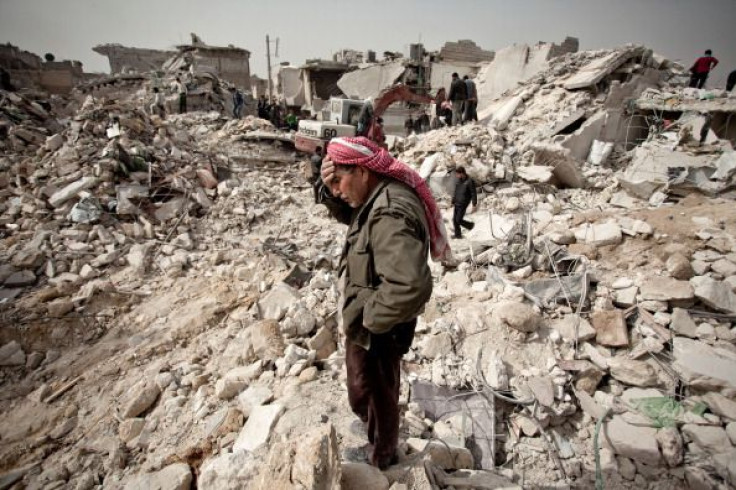Syria Ceasefire, Humanitarian Aid Drops To Aleppo Proposed By US, Russia, Iran in Munich

UPDATE: 7:12 p.m. EST -- An agreement has been reached for a nationwide "cessation of hostilities" in Syria within one week, U.S. Secretary of State John Kerry said Thursday evening, NBC News reported. The deal will not affect efforts against the Islamic State group or the Nusra Front, the report said.
Original story:
International officials meeting in Munich late Thursday night proposed a plan to end the violence in Aleppo, Syria, and help those fleeing the area as recent Russian airstrikes on Syria's largest city in support of President Bashar Assad’s regime has created one of the worst humanitarian disasters in the country since the war began in 2011, according to aid organizations.
The plan calls for an immediate ceasefire between regime forces and opposition groups. It would take place in stages and would include Russian airdrops of relief supplies to at least 15 towns and cities, humanitarian access by the United Nations, and a stop to Russian and Syrian government airstrikes. It is unclear when the plan would go into effect, but Russian officials had previously put forward a March 1 start date.
Members of the International Syria Support Group, a coalition of 17 countries that came together in 2014 to find a way to stop the yearslong bloodshed in the country, put forward the plan. The discussions did not include the Syrian regime or the Syrian opposition.
The proposal is the first of its kind because it includes an immediate ceasefire, agreed upon and supported publicly by all major international parties involved in the conflict, including Iran, Russia and the U.S. It is still unclear how exactly the plan will be implemented on the ground, and whether the regime and opposition will agree to it.
"In the end [U.S. Secretary of State John] Kerry has to go to the [Syrian] opposition and beg them to come to the table," said Andrew Tabler, an expert on Syria at the Washington Institute for Near East Policy, a think tank in Washington.
Not only will the U.S. face an uphill battle in convincing the opposition to agree, but it will also need to rely on Russia to hold up its end of the agreement. So far, Russia has not stuck by its promises in Syria. Its airstrikes have targeted U.S.-armed rebels as well as civilians, according to the State Department.
The struggle between the two countries was displayed on social media Thursday. Russian and U.S. officials took to Twitter to blame each other for the casualties in Aleppo.
Surreal times as US and Russian militaries argue on Twitter over who's bombing Aleppo. pic.twitter.com/E1iwRMU41Q
— DavidKenner (@DavidKenner) February 11, 2016
Another major hurdle to Thursday's proposal: Any ceasefire plan, though the U.S. and Russia have both publicly announced their support, would have to include a larger conversation between the U.S. and Russia about a political solution to end the war in Syria.
For the past year, the two countries have vehemently disagreed on a plan because Russia wants Assad to stay in power, at least for the time being, while the U.S. has historically wanted him to leave office immediately.
This time, though, the political discussions could look a little different. Kerry has wavered on his call for ousting Assad from power since. But other senior officials in the Obama administration are insisting on his ouster.
Meanwhile, the conflict — especially in the northern part of the country — is growing more intense each day.
The meeting in Munich comes as Russia, in support of the Assad regime, has launched a massive campaign to bomb Aleppo. Its airstrikes, which intensified this month, have allowed the Syrian regime, and its Iranian troops, to move into areas it once held back in 2011. The regime now holds territory that nearly encircles Aleppo city, the country's main trade hub.
As a result of the bombings, tens of thousands of people have fled to the border of Turkey. They are living in makeshift camps and abandoned buildings because Turkey, already overwhelmed with Syrian refugees, will not open the border. As the people of Aleppo flee, the bombs follow them. Many of those fleeing are taking a route that passes through the city of Azaz, which is also being bombed regularly.
#Syria: We provided essential shelter items including tents, blankets & mattresses to more than 700 families #Azaz pic.twitter.com/qrYo7qXhDe
— MSF International (@MSF) February 10, 2016
Humanitarian organizations on the ground in Syria have estimated that more than 500 people have been killed this month alone because of the Russian airstrikes. Not only are the bombs hitting civilians, but they have also landed on hospitals.
© Copyright IBTimes 2024. All rights reserved.











